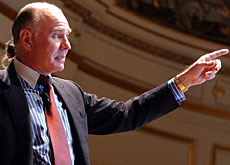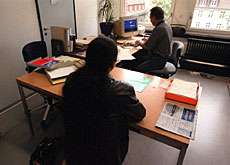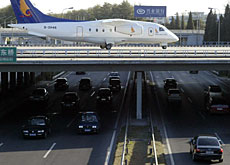Dr Doom sees Asia’s star rising

Swiss financial guru Marc Faber predicts that a collapse in consumer spending could push the United States into recession within two years.
In an interview with swissinfo, he said Asia would likely be the engine of global growth, while Switzerland would stagnate.
Faber, known affectionately as “Dr Doom” for swimming against the tide of conventional economic wisdom, gave his views on the state of the world economy and how it might develop at a presentation in Zurich for Credit Suisse Asset Management.
Speaking before a packed house, Faber said he believed that the dollar would fall in terms of its purchasing power over time, while wealth would grow in Asia.
He was not particularly optimistic about the future of the Swiss economy.
After the presentation, Faber expanded on some of his thoughts for swissinfo’s Robert Brookes:
swissinfo: How would you describe the current state of the global economy?
Marc Faber: We have very significant imbalances. In the United States the debt level is rising very rapidly and generating some, what I would call, artificial growth but it doesn’t produce capital spending or net capital spending. The capital spending occurs largely in Asia, specifically in China, and the production is also in Asia.
In other words we have these continuous, very large trade and current account deficits of the US and as a result we have wealth accumulating in Asia. This is reflected in the rising foreign exchange reserves of central banks in Asia and also of rising asset prices and in some cases rising currencies.
swissinfo: So if you look into your crystal ball, where are we heading?
M.F.: I think that we will have continuing turbulence in the global economy. The US will probably not be able to sustain current growth rates and we will have probably, some time in 2004 or 2005, a consumer-led recession again in the US.
In Asia, the economies are so large already and the Chinese economy as you know is growing very rapidly with industrial production up by about 20 per cent this year, so that I think Asia will withstand this recession.
But obviously the financial markets are correlated, so if the Dow Jones drops 500 points, the Asian markets will also decline. But I think the trend in Asia is for an outperformance of financial assets vis-à-vis the US.
swissinfo: Where are the savvy investors going to put their money over the next few years?
M.F.: What I’ve noticed is that a lot of investors have acquired resources, hard assets, in other words real estate, especially in countries that are opening up – eastern Europe, Asia where the price level is very low – and they’re buying commodities, including gold which is one of the world’s currencies.
We have four other currencies in the world, the US dollar, the euro, the yen and the (Chinese) renminbi. These are all paper monies and the supply of this paper can be increased indefinitely, whereas the supply of gold is tied to the mining production annually of 2,500 tons, which is equivalent to around $35 billion.
So there is more and more paper money per unit of gold and I think that the gold bull market is in the initial stages. We had a rise from April 2001 from $258 to around $390 now. I think the gold price will be much higher than it is today.
swissinfo: What’s going to happen here in Switzerland over the next few years?
M.F.: I think the investment activities here in terms of industrial investments will be very anaemic.
In other words, if Swiss companies want to survive, they will have to produce in lower cost countries such as China or Vietnam, and services will also shift increasingly to countries like India where services can be provided at much lower cost than in Switzerland.
As we go forward, I think the economic growth rate will be quite disappointing. If the standards of living here in Switzerland can be maintained, that is about the best you can expect.
swissinfo-interview: Robert Brookes
Marc Faber believes that if the present recovery is genuine, commodity prices and interest rates will rise.
He argues that economic weakness in 2004 is a “distinct possibility”.
To what extent foreign investors will continue to finance US economic growth depends largely on investment opportunities outside the US, he maintains.
He feels that financial markets around the world are set to become very volatile.
Faber says standards of living in Switzerland will at best be maintained. He sees companies shifting further production outside the country to stay competitive.
Marc Faber was born in Zurich and obtained a PhD in economics magna cum laude from the University of Zurich at the age of 24.
From 1978 to 1990, he was managing director of Drexel, Burnham and Lambert in Hong Kong.
In June 1990, he set up his own business that acts as an investment adviser, fund manager and broker/dealer.
He now lives and works in northern Thailand, but maintains an office in Hong Kong.
Faber publishes a monthly investment newsletter entitled “The Gloom, Boom and Doom Report”.

In compliance with the JTI standards
More: SWI swissinfo.ch certified by the Journalism Trust Initiative




You can find an overview of ongoing debates with our journalists here. Please join us!
If you want to start a conversation about a topic raised in this article or want to report factual errors, email us at english@swissinfo.ch.